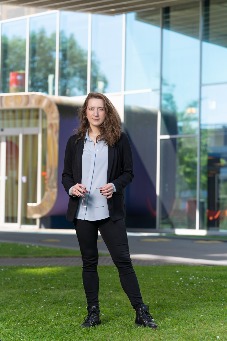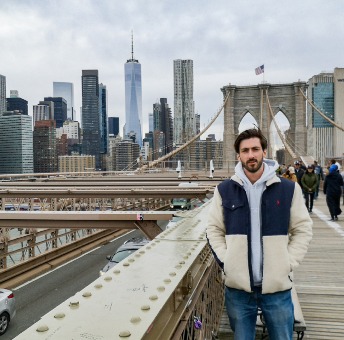From Groningen to New York and Illinois
| Date: | 06 September 2022 |

Research is often an international endeavor, a collaborative effort together with colleagues from other universities abroad. FEB Research spoke to Nevena Ivanovic and Guido Berends, PhD candidates at FEB who both recently visited universities in the US for their projects. They are now back in the Netherlands and told us about their research and their experiences abroad.

Nevena Ivanovic - Northwestern University (Illinois)
“I am a fourth-year PhD candidate in the department of Human Resource Management & Organizational behavior, supervised by Gerben van der Vegt, Thom de Vries and Dirk Pieter van Donk. I completed my bachelor and master’s degree in psychology at the University of Belgrade and spent two years at the University of Bamberg in Germany in a student exchange program before starting my PhD. As a master’s student, I was searching for a PhD program where I could research how organizations can effectively respond to disruptions and crises. Eventually, I found the PhD posting in Groningen on a NWO grant Building cooperation capabilities for improving resilience and optimizing joint maintenance in future infrastructures. This is how I came to Groningen in 2018. Outside my work, I like being active and exploring new hobbies. I enjoy contemporary dance and recently started an improv comedy class.”
Research
“I am passionate about understanding what characterizes successful individuals and teams working in challenging circumstances (e.g. time pressure, stress, disruptions), and how they can rely on technology to sustain their performance and wellbeing. The goal of my PhD research is to empirically demonstrate the impact of small-scale workplace stressors on resilience and to identify strategies to effectively deal with them. I conduct my research using communication logs of employees in their workplace, which allows me to follow fine-grained changes in communication behavior and explore how these relate to different performance levels. My research focuses on organizations with critical functions (e.g. critical infrastructure organizations), and work contexts with extreme time pressure (e.g. accelerated innovation). In such situations, dealing with stress depends on the ability to effectively work in collaboration with others. As such, I focus on detecting how the change in communication behavior between workers is related to their ability to effectively resolve daily disruptions.”
Research visit to the US
“I was at Northwestern University (Illinois), specifically at ATLAS lab, hosted by professor Leslie DeChurch and professor Noshir Contractor. Since I am interested in the performance of individuals in challenging circumstances, I was drawn by their research on teams in space. They have led numerous projects funded by NASA, and I was curious to learn more about how they conduct their studies. Conducting teams research in the context of space exploration brings additional challenges related to, for example, communication delay. As someone interested in team communication myself, it was interesting to see these additional variables being explicitly measured and tested. The members of the ATLAS lab were very friendly and welcoming. They were very open to talk about their ongoing research, and also involved me in social activities that allowed us to bond and helped me learn more about American culture. It was interesting to be part of a close-knit small lab where everyone knows what others are working on, sharing their energy in setting up and conducting experiments. In that sense, it is a different working environment to the one at FEB – mostly because my department here is much larger with researchers working on very different topics.”
Collaboration
“I am working on my final dissertation chapter in collaboration with dr. Aaron Schecter from the University of Georgia, along with Leslie DeChurch, Noshir Contractor, and my supervisors in Groningen. We are applying one form of network analysis called relational event modeling to understand how communication patterns between employees in a company are related to the changes in organizational performance. As I am applying relational event modelling in one of my dissertation projects, starting a new collaboration with the researchers who are experts in this method was important to advance the quality of my work. I am also working on a side project on team task-switching with my colleagues at Northwestern University, in which we use agent-based modelling on data collected in the NASA space analog. Learning more about this method and it’s different applications is very useful for the projects I plan to work on in the future. My research stay in the US was a valuable experience for me both professionally and personally. I would definitely recommend other students to plan research stays abroad, as learning about other cultures and research environments allows you to learn more about yourself and develop as a researcher. ”

Guido Berends - Cornell University (New York)
“Before starting my PhD at the Innovation Management & Strategy department almost three years ago, I obtained a master’s degree in Business Administration and a Research Master in Economics and Business both here, at the Faculty of Economics and Business. So, I have been at FEB, and in Groningen, for quite a while now. Currently though, I live in Amsterdam. Outside of work, I try to take advantage of the entertainment provided by the city and every now and again I play a round of golf.”
Research
“My dissertation focuses on how firms behave after being publicly accused of corporate misconduct. In particular, my colleagues and I are interested in how different stakeholders respond to the behavior displayed by the firm and its leadership in the wake of misconduct. In the first chapter, for instance, we study how firms accused of environmental misconduct repair their damaged reputation. With the insights generated in this project, we caution regulators, investors, and watchdog organizations of the possibly misleading persuasiveness of reform efforts from some firms. Our data shows that while orchestrating corrective actions over time helps firms regain lost reputation, it does not necessarily lead to substantive changes within the firm.”
Research visit to the US
“During my research stay in the US, I visited the SC Johnson Graduate School of Management at Cornell University. Cornell is located in Ithaca, New York state, and is about a four-hour drive from New York City. One of my supervisors, Dr. Mitzinneck, received his PhD from Cornell University and his supervisor professor Dowell, now my academic granddad, kindly agreed to host me for a research stay. I initially planned to go to the US 1,5 years ago already, but because of travel restrictions it was not possible to travel until the beginning of this year. Better late than never! At Cornell, I developed the idea for the third chapter of my dissertation and collected the necessary data for the project. It has been a such great experience to visit a University like Cornell. I had the chance to attend numerous insightful seminars and even join a few MBA classes. I met other PhD students in my field and discussed my research with different senior scholars at Cornell. A research stay is an experience I would definitely recommend to anyone who gets the chance!”
Lessons learned
“There are two things I have brought back with me from Cornell University that I will try to continue to keep in mind. The first is to not just focus on the content of my presentations, but also spend more time on refining the delivery and creating interaction with the audience, whether in class or in front of an academic audience. Of course, it was always clear that it is not just about what you present, but also how. Yet, attending the classes and seminars at Cornell showed me there is still quite a bit of room for improvement. Particularly, some of the MBA classes I joined were inspiring to watch. The second thing that I have learned is that by creating a set of ambitious goals, I allocate my time more effectively. It for example helps me determine more clearly which projects I can and would like to take on. It was quite thought-provoking to hear how some of the scholars I met at Cornell were meticulously mapping out the projects they would work on in their pursuit to achieve an ambitious goal or answer larger questions.”

